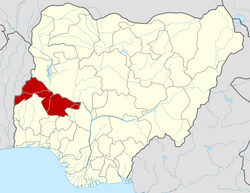This article needs additional citations for verification .(March 2018) |
This article needs attention from an expert in Nigeria. The specific problem is: basic information (such as population) is missing. See the talk page for details.(March 2018) |
Omupo | |
|---|---|
Town | |
| Coordinates: 8°16′29.18″N4°47′45.14″E / 8.2747722°N 4.7958722°E | |
| Country | |
| State | Kwara State |
| LGA | Ifelodun LGA |
| Government | |
| • Olomu of Omupo | HRM, Oba Muhammed-Yakub Adebayo Buari (Ilufemiloye II) |
| Population | |
| • Ethnicity | Yoruba (Igbomina) |
| Time zone | UTC+1 (WAT) |
| Website | http://www.kwarastate.gov.ng/ (Kwara State website) |
Omupo (or Omu-ipo) is a rural Igbomina town in the Ifelodun local government area of south-eastern Kwara State, Nigeria. [1] It is near a fortified archaeological site. [2] In February 2017, two children were killed in the town by practitioners of Yoruba religion. [3]


